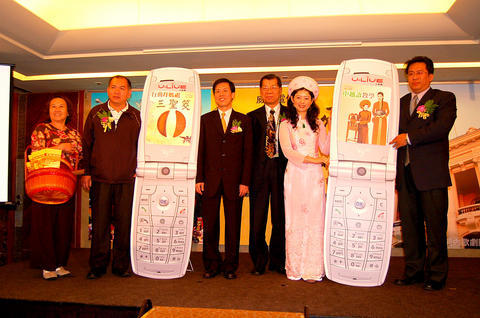After repeatedly missing its break-even target, Vibo Telecom Inc (
Vibo, the nation's pure third-generation (3G) telecom service provider, has yet to make a profit as it has failed to attract enough subscribers to achieve economies of scale amid a saturated telecom market.
In a surprise announcement last Thursday, Chang said he was retiring from Chunghwa a year earlier than planned to take on new duties. Vibo announced his appointment as chief executive later that evening. The Vibo post had been vacant for a year after David Wang (

PHOTO: LIU LI-JEN, TAIPEI TIMES
NEW START
"This is a new beginning in my career," Chang told reporters after his debut at Vibo's service launch yesterday.
Chang said he left Chunghwa because he was attracted to Vibo chairman Rock Hsu's (
Chang, 64, was with Chunghwa for more than three decades, serving in different capacities and departments, including billing, marketing and broadband service. He is known for helping Chunghwa recoup its top position in 1996 by turning the company's employees into salespersons in the early stage of government deregulation.
Talking about his new job, Chang said: "The priorities will be boosting subscriptions and expanding revenues by selling new services that will differentiate Vibo from other telecom companies."
Corporate users are the main battlefield, he said.
Senior citizens will also be a target given this expanding market, he said.
Chang declined to give specific figures nor comment on the company's goal to break even in August next year. As of June, Vibo had accumulated NT$7.7 billion (US$237 million) in losses since the commercial launch of its 3G services in 2005.
"I have set a challenging target for myself," Chang said.
After three years of commercial operation, Vibo only has 660,000 subscribers, which is less than a third of Chunghwa's 2.2 million 3G users.
NO CURE ALL
Despite Chang's determination to revamp Vibo, "hiring a chief executive from rival is not a cure all," said Lu Chia-lin (
Vibo's broken coverage has shut potential users out of the door as it lacks a second-generation (2G) network to fill the network gaps as the nation's major players did, Lu said.
The lack of more diversified 3G contents industrywide is also a key reason behind Vibo's slow expansion, he said.
"Lowering rates is the only thing Vibo can do to lure subscribers from other operators," Lu said.
Chang appeared to already have all his options in mind. He said that resuming handset subsidies, cutting rates and reshaping the retail channels would be some of approaches.
PRIORITY
Improving Vibo's coverage would also be high on his priority next year, he added.
Vibo "will certainly increase capital spending next year," Chang said. This year, Vibo plans to spend NT$3.5 billion on new equipment.
But that seems to be another difficult task, Lu said, as Vibo would need another NT$20 billion to improve its coverage to satisfy subscriber.

SEEKING CLARITY: Washington should not adopt measures that create uncertainties for ‘existing semiconductor investments,’ TSMC said referring to its US$165 billion in the US Taiwan Semiconductor Manufacturing Co (TSMC, 台積電) told the US that any future tariffs on Taiwanese semiconductors could reduce demand for chips and derail its pledge to increase its investment in Arizona. “New import restrictions could jeopardize current US leadership in the competitive technology industry and create uncertainties for many committed semiconductor capital projects in the US, including TSMC Arizona’s significant investment plan in Phoenix,” the chipmaker wrote in a letter to the US Department of Commerce. TSMC issued the warning in response to a solicitation for comments by the department on a possible tariff on semiconductor imports by US President Donald Trump’s

The government has launched a three-pronged strategy to attract local and international talent, aiming to position Taiwan as a new global hub following Nvidia Corp’s announcement that it has chosen Taipei as the site of its Taiwan headquarters. Nvidia cofounder and CEO Jensen Huang (黃仁勳) on Monday last week announced during his keynote speech at the Computex trade show in Taipei that the Nvidia Constellation, the company’s planned Taiwan headquarters, would be located in the Beitou-Shilin Technology Park (北投士林科技園區) in Taipei. Huang’s decision to establish a base in Taiwan is “primarily due to Taiwan’s talent pool and its strength in the semiconductor

An earnings report from semiconductor giant and artificial intelligence (AI) bellwether Nvidia Corp takes center stage for Wall Street this week, as stocks hit a speed bump of worries over US federal deficits driving up Treasury yields. US equities pulled back last week after a torrid rally, as investors turned their attention to tax and spending legislation poised to swell the US government’s US$36 trillion in debt. Long-dated US Treasury yields rose amid the fiscal worries, with the 30-year yield topping 5 percent and hitting its highest level since late 2023. Stocks were dealt another blow on Friday when US President Donald

UNCERTAINTY: Investors remain worried that trade negotiations with Washington could go poorly, given Trump’s inconsistency on tariffs in his second term, experts said The consumer confidence index this month fell for a ninth consecutive month to its lowest level in 13 months, as global trade uncertainties and tariff risks cloud Taiwan’s economic outlook, a survey released yesterday by National Central University found. The biggest decline came from the timing for stock investments, which plunged 11.82 points to 26.82, underscoring bleak investor confidence, it said. “Although the TAIEX reclaimed the 21,000-point mark after the US and China agreed to bury the hatchet for 90 days, investors remain worried that the situation would turn sour later,” said Dachrahn Wu (吳大任), director of the university’s Research Center for